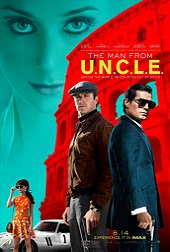The Man from U.N.C.L.E. is the latest attempt to transform a bygone television show into a new cinematic franchise, following in the shadow of Mission: Impossible, The Equalizer, Get Smart, and too many more to list. A retro, old-fashioned spy caper, The Man from U.N.C.L.E. is based on the TV show of the same name from the 1960s, and thankfully it's a strong enough movie to stand alone as its own entity - it still works even if you aren't familiar with the show. Sleekly directed by Guy Ritchie (Sherlock Holmes, Snatch), the movie is admittedly light on substance, but the execution is truly something to behold, with Ritchie working overtime to turn the humdrum narrative into a genuinely exciting blockbuster. It's a ridiculously entertaining and often droll espionage globe-trotter, bolstered by the jazzy music, stylish photography, spot-on period detail, sumptuous locales and taut editing, and the end result is undeniably endearing, as hollow as it may be.
Set in 1963 as the Cold War is heating up, stylish C.I.A. agent Napoleon Solo (Henry Cavill) is assigned to retrieve a car mechanic named Gaby (Alicia Vikander) from East Berlin. Gaby is the daughter of a top nuclear scientist who's tied to a powerful weapon with the potential to end the world, and the United States government hopes that Gaby can help find her missing father to thwart the plot. Despite the tensions between America and the Soviet Union, the warring governments recognise the gravity of the situation, putting aside their differences to work together. Thus, Solo is paired with KGB Agent Illya Kuryakin (Armie Hammer), though the two are incredibly reluctant to trust one another. With the threat of doomsday looming, Solo and Kuryakin are sent to Rome with Gaby, instructed to infiltrate the inner circle of those suspected of possessing the world-ending nuclear warhead.
It's the period setting which sets The Man from U.N.C.L.E. apart from contemporary spy flicks. Other television adaptations like Mission: Impossible were updated to take place in the here and now, but Ritchie's flick stays true to the source. The script recaptures the political climate and the paranoia of the 1960s, using Cold War touches to establish a logical divide between Solo and Kuryakin, who have serious trust issues and even have nicknames for one another. (Solo is "Cowboy" and Kuryakin is "Red Peril.") On top of this, U.N.C.L.E. is one of the most visually distinctive actioners of recent memory due to its retro touches, with period authenticity in terms of fashion and production design, while Daniel Pemberton provides a high-energy original score that's full of memorable themes. Other tunes from the era are also called upon - for instance, the Italian ballad "Che Vuole Questa Musica Stasera?" by Peppino Gagliardi dominates one particularly fun, tongue-in-cheek set-piece. Indeed, Ritchie's unique cinematic sensibilities are on full display here, and it's marvellous.
Written by Ritchie and frequent collaborator Lionel Wigram, The Man from U.N.C.L.E. moves at an involving pace, with tight storytelling, and the script is teeming with amusing bantering and comedy which makes for a constant source of joy. Ritchie even manages to infuse the necessary exposition with his trademark visual energy, and the enormously engaging action sequences actually make sense in the context of the narrative, rather than coming across as an excuse for bombastic theatrics. Momentum does noticeably lag, however, during a prolonged torture sequence that runs beyond its logical closure point, but Ritchie compensates for this with a borderline flawless finale which manages to be smart as well as exciting. U.N.C.L.E. greatly benefits from its visual scheme, with superlative photography courtesy of veteran cinematographer John Mathieson (X-Men: First Class, Gladiator), and though the movie was lensed digitally, it does carry the look of celluloid, with a slightly washed-out colour palette to resemble spy films from the 1960s. Ritchie employs split-screens to provide an extra visual spark, and even finds time for some creative sight gags, including an inventively-staged speedboat chase.
Cavill is a great fit for the role of Solo, with the British thespian swallowing his native accent to espouse an effectively exaggerated American drawl. He's an enormously charismatic presence, handling the humorous dialogue effectively and coming off as effortlessly cool. Equally solid is Hammer, who just cannot catch a box office break, it seems. Still, it's difficult to fault the actor here, who's an irresistible Illya Kuryakin, decked out with a convincing enough Russian accent. Hammer is mostly called upon to be deadpan, but manages to be likeable, and he's quite funny at times. Rounding out the main players is Vikander - last seen in the exceptional Ex Machina - who's just fine as Gaby. Other actors pop up in the supporting cast, too, with the likes of Hugh Grant and Jared Harris making their mark, while Elizabeth Debicki and Luca Calvani are great villains.
It is difficult to become genuinely invested in The Man from U.N.C.L.E., but it is undeniably entertaining, with Ritchie using every tool in his cinematic arsenal to keep the movie buoyant and eye-catching, even if it's hard to recall too much of it a few weeks after viewing. And since this is intended to be the first in a new franchise, the conclusion is open-ended to set up a possible sequel, which would be an enticing prospect. However, with The Man from U.N.C.L.E. bringing in mediocre box office returns, it's doubtful we'll see any follow-ups, which is a damn shame.
7.6/10
 Login
Login


